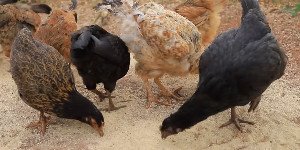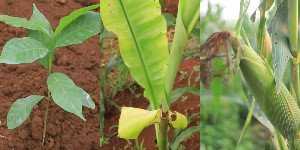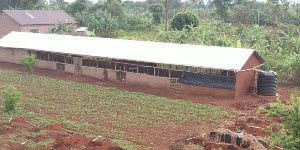Poultry Farm
Our free range egg farm is enriching the diets of 250 orphans who we regularly feed.
Our 160 hens live in a spacious building and roam freely in a large outdoor enclosure where we are growing bananas, coffee and maize (corn).
 Our newsletter article: The Secret Behind Sustainable Chicken Farming in Uganda
Our newsletter article: The Secret Behind Sustainable Chicken Farming in Uganda
Hens
We initially bought 160 hens of a local breed. We’re increasing this number by hatching their eggs naturally. The eggs are free-range. The hens can forage outdoors during the day.








Our free range methods are an example from which other farmers are eager to learn.


When we allowed our hens to roam freely among crops in a large outdoor space, their egg production increased.


Before installing our first 160 hens, we quarantined and treated them and moved them into the henhouse in phases, to prevent infection. We added roosters because we will hatch some of our eggs to expand our flock.


Crops
We planted bananas, coffee and groundnuts (peanuts) inside our hens’ enclosure. The banana trees are already bearing fruit and providing the hens with shade. We will sell the bananas and coffee to fund our work.












Matoke banana was the first crop we planted inside our hen enclosure. This banana variety is cooked and is very popular locally. We planted thousands of matoke banana trees in and near our poultry farm. Their fruit will reduce local malnutrition and will help fund our work for years to come.



Building
We constructed a large spacious building to house our hens, with its own water supply, electric lighting and a store room. We bought adjacent land and surrounded it with a fence, giving our hens a huge outdoor area to roam each day.







To bring water to our hens, we dug a well and installed a pump and a water tank. The tank will hold both well water and rainwater from the roof of the henhouse.



At first, we built the roof and walls of the henhouse, fitted wire mesh and levelled the floor.







